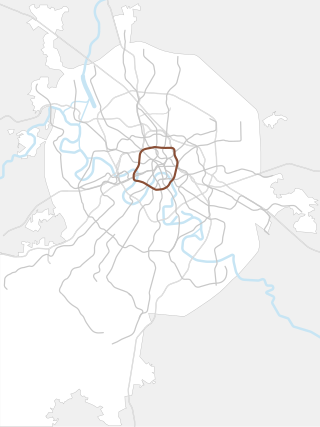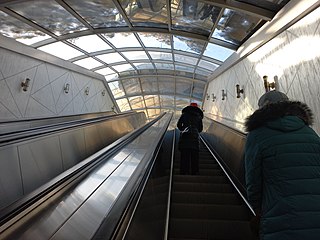5-bekat, which literally means "Station 5", was a provisional name of two different stations of Tashkent Metro:
5-bekat, which literally means "Station 5", was a provisional name of two different stations of Tashkent Metro:

The Mass Transit Railway (MTR) is a major public transport network serving Hong Kong. Operated by the MTR Corporation (MTRCL), it consists of heavy rail, light rail, and feeder bus services, centred around a 10-line rapid transit network, serving the urbanised areas of Hong Kong Island, Kowloon, and the New Territories. The system encompasses 245.3 km (152.4 mi) of railways, as of December 2022, with 179 stations—including 99 heavy rail stations, 68 light rail stops and 1 high-speed rail terminus.

The Koltsevaya line is a line of the Moscow Metro. The line was built in 1950–1954 as a circle route orbiting central Moscow, and became crucial to the transfer patterns of passengers. The stations of the line were built at the height of Stalinist architecture, and include Komsomolskaya, Novoslobodskaya and Kiyevskaya.

Namma Metro, also known as Bengaluru Metro, is a rapid transit system serving the city of Bengaluru, the capital city of the state of Karnataka, India. It is the second-longest operational metro network in India with an operational length of 73.75 kilometers, just behind Delhi Metro. Upon its inauguration in 2011, it became the first underground metro system in South India. Namma Metro has a mix of underground, at grade, and elevated stations. Out of the 65 operational metro stations of Namma Metro as of October 2023, there are 57 elevated stations, eight underground stations, one interchange station and one at-grade station. The system runs on standard-gauge tracks.

The Tashkent Metro is the rapid transit system serving the city of Tashkent, the capital of Uzbekistan. It was the seventh metro to be built in the former USSR, opening in 1977, and the first metro in Central Asia. Each station is designed around a particular theme, often reflected in the station name.

The Croxley Rail Link, or the Metropolitan Line Extension, is a proposed railway engineering project in the Watford and Three Rivers districts of Hertfordshire, England, that would have connected the London Overground and the London Underground's Metropolitan line at Watford Junction. If the link were to go ahead, the Metropolitan line's terminus at Watford Underground station would be closed and the line diverted and extended from Croxley to Watford Junction via a reopened section of closed line. The main proponent of the scheme was Hertfordshire County Council but it failed to win the support of Transport for London (TfL) which owns the Watford branch. The engineering works would have consisted of the realignment of the disused Watford and Rickmansworth Railway's line between Croxley Green and Watford High Street, with the construction of a viaduct over the Grand Union Canal, River Gade and A412 road and two new stations before branching into the London Overground line near Watford High Street and continuing to Watford Junction.

The Green Line is one of the two lines in the Dubai Metro network in Dubai, United Arab Emirates. It runs through Deira and Bur Dubai, generally parallel to Dubai Creek. There are 20 stations on the line, spanning from Etisalat to Creek covering 22.5 km (14.0 mi). It was built by a consortium of Mitsubishi, Obayashi, Kajima and Yapı Merkezi.

The Airport Express Line or Orange Line is a Delhi Metro line from New Delhi to Yashobhoomi Dwarka Sector - 25, linking Indira Gandhi International Airport. The total length of the line is 22.7 km (14.1 mi), of which 15.7 km (9.8 mi) is underground and 7.0 km (4.3 mi), from Buddha Jayanti Park to Mahipalpur, elevated.

The Delhi Metro is a rapid transit system which serves Delhi and its adjoining satellite cities of Ghaziabad, Faridabad, Gurugram, Noida, Bahadurgarh and Ballabhgarh in the National Capital Region of India. The system consists of 10 colour-coded lines serving 256 stations, with a total length of 350.42 kilometres (217.74 mi). It is India's largest and busiest metro rail system and the second-oldest, after the Kolkata Metro. The metro has a mix of underground, at-grade, and elevated stations using broad-gauge and standard-gauge tracks. The metro makes over 4,300 trips daily.

Olmazor is a station of the Tashkent Metro on Chilonzor Line. It is located between Chilonzor and Bekat-1.

Sivaganga railway station is an NSG–5 category Indian railway station in Madurai railway division of Southern Railway zone. It serves Sivaganga, located in Sivaganga district of the Indian state of Tamil Nadu.

Tuzel is a Tashkent Metro station on Circle Line. It was opened on 30 August 2020 as part of the inaugural section of the line between Texnopark and Qoʻyliq. The station is located between Yashnobod and Olmos.

Rohat is a Tashkent Metro station on Circle Line. It was opened on 30 August 2020 as part of the inaugural section of the line between Texnopark and Qoʻyliq. The station is located between Olmos and Yangiobod.
Yangiobod is a Tashkent Metro station on Circle Line. It was opened on 30 August 2020 as part of the inaugural section of the line between Texnopark and Qoʻyliq. The station is located between Rohat and Qoʻyliq.

Qoʻyliq is a Tashkent Metro station on the Circle Line. It was opened on 30 August 2020 as the southern terminus of the inaugural section of the line between Texnopark and Qoʻylik. On 30 August 2020 the line was extended to Quruvchilar, and the station ceased to be the terminus. The adjacent stations are Yangiobod and Matonat.

Choshtepa is a station of the Tashkent Metro on the Chilonzor Line. It was put into operation on December 26, 2020, as part of the third section of the Chilanzar line, between Olmazor and Chinor. The station is located between Olmazor and Oʻzgarish.
Sirgʻali is a station of the Tashkent Metro on Chilonzor Line. It was put into operation on December 26, 2020, as part of the third section of the Chilanzar line, between Olmazor and Chinor. The station is located between Oʻzgarish and Yangihayot.
5-bekat, which literally means "Station 5", was a provisional name of two different stations of Tashkent Metro:
4-bekat, which literally means "Station 4", was a provisional name of two different stations of Tashkent Metro:

Chinor is a station of the Tashkent Metro on Chilonzor Line. It is the southern terminus of the line. The station was put into operation on December 26, 2020, as part of the third section of Chilonzor line, between Olmazor and Chinor. The adjacent station is Yangihayot.
Matonat is a Tashkent Metro station on the Circle Line. It was opened on 30 August 2020 as part of the extension of the line between Qoʻyliq and Quruvchilar. The adjacent stations are Qoʻyliq and Qiyot.